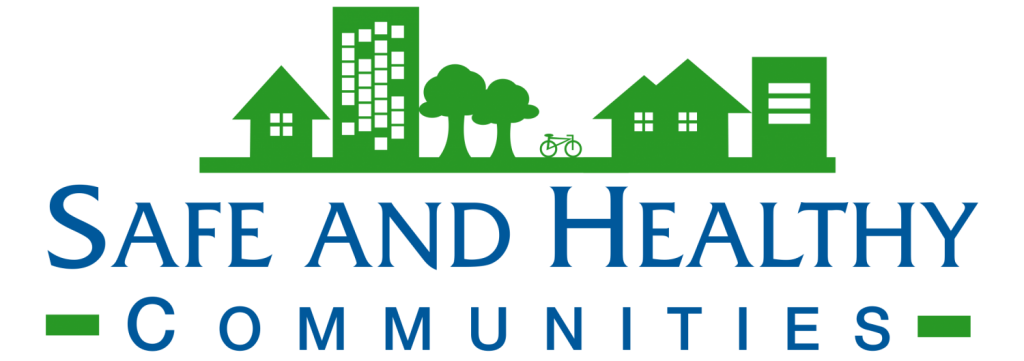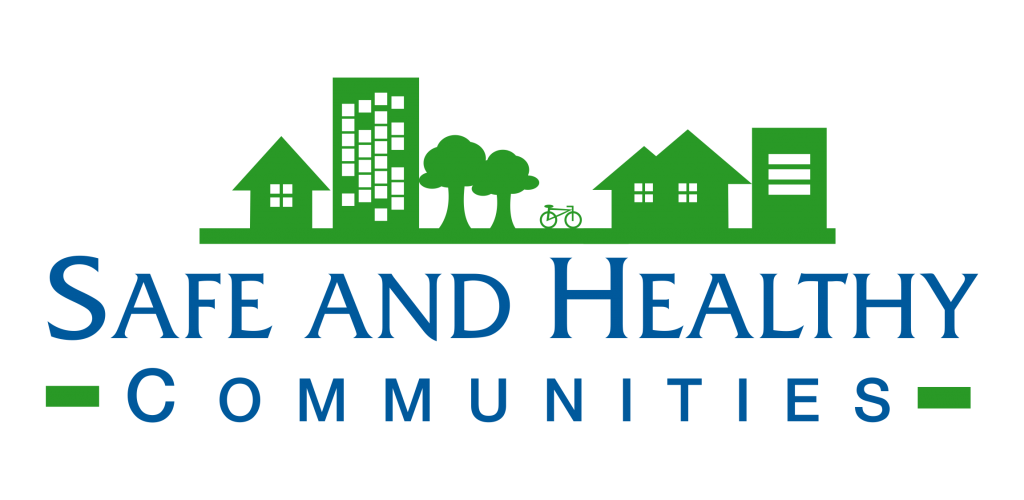Helping Communities Create Healthy Places
ABOUT US
Our Vision
We envision all communities to have equal access to quality education, jobs, housing, health-care, safe roads and parks, opportunities for physical activity, nutritious food, and multi-modal transportation. Understanding that human health is a function of economic, environmental, and social factors, which must be balanced to achieve a good quality of life.
Our History
Safe and Healthy Communities 501(c)3 (SHC) was formerly a business called Envirohealth Consulting from 2003-2016. Envirohealth was one of the first private firms conducting health impact assessments (HIAs) and helping public health, planning, and transportation agencies integrate health into land use and transportation planning. Envirohealth worked in more than four states and the District of Columbia, assisting eight leading national organizations, universities, and foundations, and collaborating with over a hundred local urban planning, public health professionals, businesses, and community residents.
SHC continues this effort concentrating on systems change, research, advocacy, and supporting cross-sector collaboration.
SHC Values
- Evidence-based research, best practices, and community knowledge guide us to action, change, and solutions. In public and environmental health, solutions are complex, symbiotic, and systemic. Partnerships and collaborations across sectors are crucial to creating collective impacts for healthier and safer communities. Understanding that many communities have been historically underserved and under-resourced, addressing health inequities and the social determinants of health are a top priority.
Our Commitment to Equity
SHC is committed to advancing health equity by actively working to address the root causes of inequity, including but not limited to social or economic obstacles to health or environmental needs based on an individual’s racial or ethnic group, religion, socioeconomic status, gender, age, mental health, cognitive, sensory or physical disability, sexual orientation, geographic location or other characteristics historically linked to underrepresentation, discrimination, or marginalization. Similarly stated, equity is when everyone, regardless of who they are or where they come from, has a fair and just opportunity to live life to their full health potential, and removing or mitigating barriers such as poverty and discrimination so that all people can thrive.
SHC is committed to authentic community engagement and will support those populations and communities that are typically and historically disenfranchised so they can drive their own decision-making. All policies, programs, and procedures at SHC will consider the following strategies during development, implementation, and evaluation:- Be culturally and linguistically appropriate for the population.
- Engage and support people and communities to plan and implement prevention policies and programs.
- Provide residents with the skills to change their environments and opportunities to lead a meaningful life.
- Create a data platform that is populated with local and state data on agreed-upon equity indicators from a variety of related partners.
- Recognize and address racism, sexism, homophobia, and stigma associated with differing mental and physical abilities.
- Help everyone understand what factors produce positive or negative health outcomes and why health disparities affect everyone.
- Analyze available data to determine health disparities that exist for populations served.
Our Team
Karen Roof, Ph.D, Founder
and Executive Director
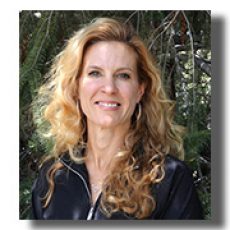
Karen has been working for over fifteen years at the nexus of public health and the built environment. Karen conducts national surveys, citywide trainings and local health impact assessments related to policies that support healthy communities, particularly those residents most vulnerable and disadvantaged. Concurrently, Karen taught an interdisciplinary graduate course from 2008-2013 at the University of Colorado Denver called, Planning for Healthy Communities: A Public Health and Urban Planning Approach. Prior to being the Executive Director, Karen managed multiple environmental public health grant programs for six years leveraging over 2 million in grant funding from the Centers for Disease Control and Prevention (CDC), Agency for Toxic Substances and Disease Registry (ATSDR), and the Environmental Protection Agency (EPA) at the National Association of City and County Health Departments (NACCHO).
Rena Soller, MPH,
Research Coordinator
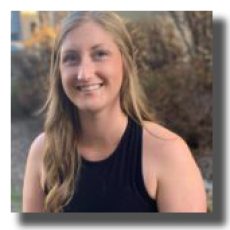
Rena completed her Bachelor of Science degree in Human Nutrition at Kansas State University in Manhattan, KS. During her undergraduate career, she obtained a personal training certification, where her passion for working with older adults began. Here, she realized there are more issues with aging than just physical health, and she wanted to do considerably more for older adults to help them to age successfully in all aspects of their lives. She is currently in her last semester as a graduate student in the Colorado School of Public Health at the University of Colorado’s Anschutz Medical Campus. Her interests include how well-designed built environments can help older adults age successfully in place, as well as providing access and equity to vulnerable and underserved populations.
Sean Rusnak, Built Environment
and Social Media Specialist
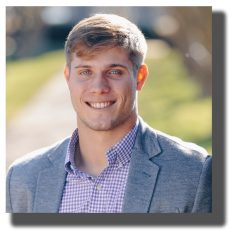
Sean completed his Bachelor of Science in Public Health and Bachelor Arts in Political Science at Furman University in Greenville, SC. In his undergraduate career and the year following, Sean focused his studies and professional work on the intersection of the built environment and public health. He worked with several community partners to employ collective impact and policy, systems, and environment approaches to foster sustainable change in the community, such as advocating for an annual increase in public transportation funding. Sean is currently in the first year of pursuing his Master’s of Public Health at the Colorado School of Public Health Anschutz Campus and his Master’s of Urban Planning at the University of Colorado Denver. His interests include demonstrating the return on investment of funding built environment solutions to reduce chronic disease and combat the rising cost of healthcare in the United States.
Subcontractors
As needed for specific projects, Safe and Healthy Communities (SHC) collaborates with partners and usually hires consultants with different areas of expertise and technical knowledge.
Our Board
Safe and Healthy Communities Board of Directors
Dejenaba N. Gordon,
MPH
.

Dejenaba N. Gordon originally from Camden, New Jersey, obtained a Bachelor of Science degree, from Temple University in 2009 and a Master of Public Health from Drexel University, 2012.
In November, (2015) she joined Arcadia University Department of Public Health. She is an Assistant Professor teaching in both MPH and BSPH programs and serves as MPH Internship Coordinator. In addition, she coordinates international service-learning trips for students.
Before joining Arcadia University, she worked at Public Health Management Corporation managing two community-based programs Philadelphia Hepatitis Outreach Project (P-HOP), and HIV/ HCV Prevention Street Outreach Project. P-HOP offers viral hepatitis education, screening, outreach, and linkage to care services for community-based organizations. HIV/HCV Prevention Street Outreach engages over 10,000 Philadelphian residents through education sessions, condom, and literature distribution. She managed fiscal responsibilities, program service deliverables and supervised staff for both programs.
Currently, she teaches community Yoga classes in South Jersey and Philadelphia and is a provider for Unite for Her, serving women who have breast cancer.
Heidi Wilson, MS,
Spokane Regional
Health District,
WA

Heidi specializes in developing, facilitating, and coaching teams to conduct comprehensive community-based participatory planning. Heidi has over 15 years of experience in strategic planning, project management, and organizational development. She began her career at the National Association of County and City Health Officials where she managed multiple public and environmental health programs, most notably a comprehensive community-based public health systems strategic planning and assessment process and a land use planning initiative that supported local public health agencies use of Health Impact Assessments. As VP of Program Development and Management at Strategic Applications International (SAI), Heidi was responsible for the implementation of all federal grants. SAI’s strategic approach was to develop multi-disciplinary strategies through community partnerships to address complex community issues such as approaches to address substance abuse and trafficking of illicit goods.
Heidi received her Masters of Arts in International Relations from St. Andrews University, Scotland, and a M.S. in (International) Development Management, with a concentration in qualitative research, at American University in Washington DC.
Marla K. Hollander, MPH, The American Heart Association, Washington DC

Marla currently serves as the National Partnership Manager for Voices for Healthy Kids – a joint effort between the American Heart Association and the Robert Wood Johnson Foundation to ensure all kids have access to healthy food, beverages and safe places to be physically active. In this role, she guides a team approach to collaboration and partnership connecting over one hundred national organizations to advance policy and mission-aligned efforts. Prior to her work at AHA, she served as the founding director of Active Living Leadership, a multimillion dollar national initiative supporting state and local, elected and appointed officials, creating healthy community design policies that enable healthy lifestyles. As a former member of The Robert Wood Johnson Foundation program team, Ms. Hollander was a primary developer of the active living concept and supported the creation of the initial active living grant portfolio in excess of $100 million dollars.
Ms. Hollander received her BS in business management and marketing from Tulane University and her MPH in behavioral sciences/health education from Emory University.
Jennifer Steffel Johnson, Ph.D., Associate Chair and Clinical Assistant Professor
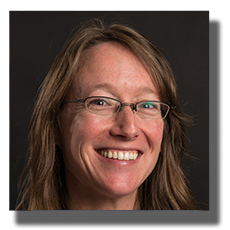
Department of Planning and Design, University of Colorado Denver.
Dr. Johnson is a Clinical Assistant Professor in CU Denver’s Department of Urban and Regional Planning, as well as the department’s Associate Chair. Her research interests and courses focus on issues of housing affordability, social justice, community development, and the myriad ways that housing impacts communities and diverse populations. She is also passionate about experiential education and the mutual benefits it can provide for students and the community.
Her previous work experience includes being Senior Policy Analyst at the Partnership for Working Families, Director of Cooperative Education for the College of Engineering at Northern Arizona University, and Assistant Director of Housing Programs for Christian Relief Services.
Jenny received her bachelor’s degree from Cornell University, specializing in interior design and housing economics. Her master’s degree is from the Architecture of Affordable Homes program at McGill University. She earned her Ph.D. from the University of Colorado Denver, College of Architecture and Planning, in 2006.
SHC is currently searching for two new board members. At least one of the new board members needs to represent the non-profit/foundation sector. SHC is seeking more diversity among its board members. If interested, please contact Karen Roof at kroof@
Our Advisors
Carol Maclennan, SHC

Advisor on Program Content and Board Development, CO
Carol was Senior Environmental Health Policy Coordinator and Land Use Program Coordinator at Tri-County Health Department for 11 years, during which she was an invited speaker on the link between the built environment and health in forums from the local to the national level. After retiring in 2012, she joined the Board of Directors of the non-profit EarthLinks, which serves individuals who are experiencing homelessness. She is currently Board President. In the past, she was appointed to the Colorado Board of Health and the Colorado Hazardous Waste Regulatory Committee. Her work history includes Environmental Coordinator for the City of Aurora, contractor to the Colorado Office of Energy Conservation, Community Liaison for the Solar Energy Research Institute (now the National Renewable Energy Laboratory), solar energy project staff in the CO Governor’s Office, and social worker.
She received a B.S. degree in Psychology from Penn State University and did graduate work in the University of Denver School of Social Work.
Bradyn Nicholson, MPH,
Policy and Program Advisor, CO
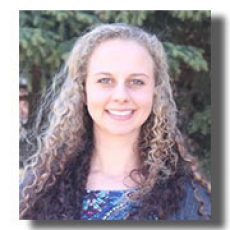
Bradyn completed her Bachelor of Science degree in Kinesiology at Kansas State University in Manhattan, KS. During her undergraduate career, she focused her studies on exercise behavioral science and gained research experience in public health physical activity and the built environment. She recently graduated from the Colorado School of Public Health at Colorado State University (CSU) graduate program with a concentration in physical activity and healthy lifestyles. She also received her masters in Urban and Regional Planning from the University of Colorado Denver, School of Architecture and Planning. Her interests include policies that support healthy communities and access for all – specifically underserved populations, transportation planning that provides streetscape prioritizing non-motorized transport, and the promotion of physical activity by integrating active transportation into activities of daily living.
Bradyn has been most recently involved with SHC projects related to identifying and reporting on model statewide transportation visioning plans that have incorporated public health language and policies into their plans, and developing a report from five focus groups conducted by SHC for a foundation about what issues they should be focusing on in the next 5-10 years related to equity.
Safe and Healthy Communities is committed to making its websites and digital content accessible to the widest possible audience. We are continuously working to increase the accessibility and usability of our digital content. We strive to maintain conformance to W3C’s Accessibility Guidelines (WCAG) 2.1 as well as digital document accessibility standards.
If you have difficulty accessing the information contained within this webpage and would like to request an accommodation or request an alternative format, please contact us.
